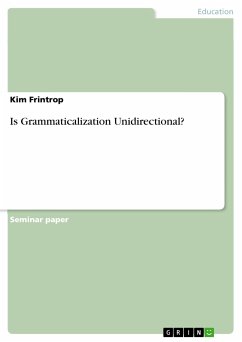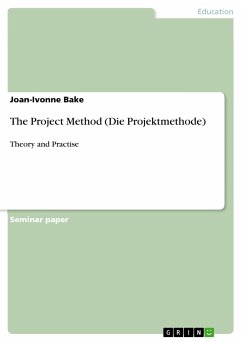Seminar paper from the year 2014 in the subject Didactics for the subject English - Pedagogy, Literature Studies, grade: 1,7, Johannes Gutenberg University Mainz, course: Seminar English Linguistics, language: English, abstract: Grammaticalization is a well-attested process of language change and presents a complex sub-field of linguistics. Although grammaticalization is believed to be a rather young area of linguistics, its history is as old as the history of linguistics (cf. Narrog & Heine 2011: 1). The term ‘grammaticalization’ itself was apparently first coined by the French linguist Meillet, a pioneer in the field of grammaticalization. In his work L’évolution des formes grammaticales (1912), Meillet describes the process of grammaticalization as “Le passage d’un mot autonome au rôle d’élément grammatical” (1912: 131 cited in Ferraresi 2014: 1) indicating a change of an erstwhile autonomous sign into a grammatical element. A more recent definition of grammaticalization is given by Hopper and Traugott who define it as “the process whereby lexical items and constructions come in certain linguistic contexts to serve grammatical functions, and, once grammaticalized, continue to develop new grammatical functions” (2008: xv). Although the field of grammaticalization is already widely explored, its studies remain interesting since several of them have been the subject of critical discussions. One of the most interesting and challenging hypotheses in grammaticalization studies is presented by the unidirectionality hypothesis: “the claim that changes that fall into the category of grammaticalization always move into the direction – from more to less lexical or from less grammatical to more grammatical” (Börjars & Vincent 2011: 163). However, is it not possible for a grammatical item to become less grammatical or even lexical? On the basis of Norde’s recent study on degrammaticalization (2009; 2012), the paper will take a closer look whether the unidirectionality hypothesis is entirely true or not. The following paper is structured as follows: section two provides a brief overview of central concepts and definitions involved in grammaticalization and finally it presents Lehmann’s parameters of grammaticalization (1995). In section three, the paper features a central approach on how the unidirectionality hypothesis can be explained. Section four presents two valid counterexamples of the unidirectionality hypothesis with respect to Lehmann’s parameters (1995). To conclude, the paper summarizes the main results.
Bitte wählen Sie Ihr Anliegen aus.
Rechnungen
Retourenschein anfordern
Bestellstatus
Storno









